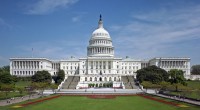Music Modernization Act Passed in Senate, Returns to House
September 26, 2018
Following the House of Representatives passage of the Music Modernization Act in April, the U.S. Senate also gave its unanimous consent on September 18. The bill was renamed after Republican Utah senator Orrin Hatch, also a songwriter, scheduled to retire at the end of his term this year. With the Senate passage, the bill will return to the House to get approval for all the changes made to achieve Senate approval. If and when the House approves, the bill will go to President Donald Trump to become law.
Billboard reports that some have called the bill “compromise legislation” because of SiriusXM’s aggressive lobbying. In response to this lobbying, on the day before the Senate vote, “about 150 artists said they were going to organize a boycott against SiriusXM majority stakeholder, Liberty Media, if the bill didn’t pass.” The three-part bill, says Billboard, “gives something to different rights holders, thanks to compromises from most of the industry including music licensees.”

“Today is a momentous day for songwriters, artists, composers, producers, engineers and the entire industry that revolves around them,” stated National Music Publishers Association president/chief executive David Israelite. Songwriters of North America executive directors Michelle Lewis and Kay Hanley explained that their organization “would like to thank Senators Hatch, [Lamar] Alexander, [Sheldon] Whitehouse, [Dick] Durbin and all the other Senate co-sponsors for passing Orrin G. Hatch Music Modernization Act.”
The legislation “creates a blanket mechanical license and establishes a collective to administer it … [and] reshapes how courts can determine rates, while making sure future performance rates hearings between performance rights organizations BMI and ASCAP and licensees rotate among all U.S. Southern District Court of New York Judges, instead of being assigned to the same two judges, Judge Denise Cote for ASCAP and Judge Louis Stanton for BMI, as its done now.”
It creates a royalty for “labels, artists and musicians … for master recordings created prior to Feb. 15, 1972,” and eliminates the previous “carve-out” for “pre-existing digital services” like SiriusXM and Music Choice. It also “codifies a process for SoundExchange to pay producers and engineers royalties for records on which they have worked.”
Music publisher ASCAP noted that the bill improves an “outdated music licensing system and give music creators an opportunity to obtain compensation that more accurately reflects the value of music in a free market.”
Inside Radio explains the impact of the impending law on the radio industry, stating that it “will likely cost stations more for music use” since they will have to pay royalties for songs recorded prior to February 15, 1972 whenever they are streamed online (on-air is exempt). The most “significant inclusion is “a defensive measure secured by broadcast lobbyists in recent months after seeing the Dept. of Justice take steps to potentially undo the decades-old consent decrees governing how ASCAP and BMI rates are set.”
Now, the DOJ “would be required to alert Capitol Hill of its plans at least 90 days before it takes any steps in federal court to terminate the decrees.” NAB president Gordon Smith stated that, “these decrees are essential to a functioning music marketplace.”
Update:
Music Modernization Act On the Brink of Becoming Law, Awaits Only President’s Signature, Billboard, 9/25/18

No Comments Yet
You can be the first to comment!
Sorry, comments for this entry are closed at this time.